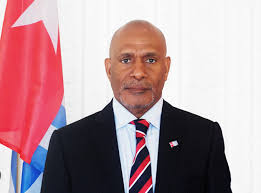It has been 60 years since Indonesia has refused humanitarian agencies and international media access to enter West Papua.
According to Benny Wenda, the President of the United Liberation Movement for West Papua (ULMWP), Indonesia is comparable to North Korea in terms of media access. North Korea does not allow international media visits, and the situation in West Papua is similar.
Speaking with the Vanuatu Daily Post Wenda said organisations such as the Red Cross, International Peace Brigades, Human Rights Agencies, and even the British Broadcasting Corporation (BBC) have been completely banned from West Papua for 60 years.
“Indonesia claims to be a democratic country. Then why does Indonesia refuse to allow, in line with calls from the Pacific Islands Forum (PIF) and the Melanesian Spearhead Group (MSG), a visit from the United Nations (UN) Commissioner to examine the human rights situation? It has been 60 years, yet Indonesia has not heeded this call, while the killings continue,” he said.
“If Indonesia truly upholds democracy, then it should allow a visit by the UN Commissioner. This is why we, as Melanesians and Pacific Islanders, are demanding such a visit. Even 85 countries have called for the UN Commissioner’s visit, and Indonesia must respect this as it is a member of the UN.”
The ULMWP also issued a statement, stating that over 100,000 West Papuans were internally displaced between December 2018 and March 2022, as a result of an escalation in Indonesian militarisation.
They reported that as of October 2023, 76,228 Papuans remained internally displaced, and over 1,300 Papuans were killed between 2018 and 2023, and a video of Indonesian soldiers torturing a West Papuan in Puncak has made international news.
In response to the disturbing video footage about incident in Papua, Indonesia stated that the 13 Tentara Nasional Indonesia (TNI) personnel (National Armed Forces of Indonesia) involved have been detained.
“The Embassy emphasised that torture is not the policy of the Government of Indonesia nor its National Armed Forces or Indonesian National Police,” the statement relayed.
“Therefore, such actions cannot be tolerated. Indonesia reaffirms its unwavering commitment to upholding human rights, including in Papua, in accordance with international standards.”
The ULMWP said Indonesian is lobbying in Vanuatu and the Pacific, presenting themselves as friends, while allegedly murdering and torturing Melanesians.
“For instance, in the Vanuatu Daily Post interview published on Thursday this week, the Indonesian Ambassador to Vanuatu claimed that West Papua was never colonised. This claim is flatly untrue: for one thing, the Ambassador claimed that ‘West Papua has never been on the UN Special Committee on Decolonisation (C-24)’ – but in fact, West Papua was added to the list of ‘Non-Self Governing Territories’ as the Dutch decolonised in the 1960s,” the Movement stated.
“According to the 1962 New York Agreement, West Papua was transferred to Indonesia on the condition of a free and fair vote on independence. However, in 1969, a handpicked group of 1,022 West Papuans (of an estimated population of 800,000) was forced to vote for integration with Indonesia, under conditions of widespread coercion, military violence and intimidation.
“Therefore, the right to self-determination in West Papua remains unfulfilled and decolonisation in West Papua is incomplete under international law. The facts could not be clearer: West Papua is a colonised territory.”
The Vanuatu Daily Post also asked some similar questions that had been posed to Indonesia on 28 March 2024, to which Wenda responded adeptly. Additionally, he provided insightful commentary on the current geopolitical landscape.
What do you believe Indonesia’s intention is in seeking membership in the MSG?
Indonesia’s intention to join MSG is to prevent West Papua from becoming a full member. Their aim is to obstruct West Papua’s membership because Indonesia, being Asian, does not belong to Melanesia. While they have their own forum called the Association of Southeast Asian Nations (ASEAN), we, as Melanesians, have the PIF, representing our regional bloc. Indonesia’s attempt to become an associate member is not in line with our Melanesian identity. Melanesians span from Fiji to West Papua, and we are linguistically, geographically, and culturally distinct. We are entitled to our Melanesian identity.
Currently, West Papua is not represented in MSG; only Indonesia is recognised. We have long been denied representation, and Indonesia’s intention to become an associate member solely to impede West Papua’s inclusion is evident.
Is Indonesia supporting West Papua’s efforts to become a full member of the MSG?
I don’t think their intention is to support; rather, they seek to exert influence within Melanesia to obstruct and prevent it. This explains their significant investment over the last ten years. Previously, they showed no interest in Melanesian affairs, so why the sudden change?
What aid is Indonesia offering Vanuatu and for what purpose? What are Indonesia’s intentions and goals in its foreign relations with Vanuatu?
I understand that Indonesia is an associate member of the MSG and contributes to its annual budget, which is acceptable. However, if Indonesia is investing heavily here, why aren’t they focusing on addressing the needs of their own people? I haven’t observed any Ni-Vanuatu begging on the streets from the airport to here (Golden Port). In contrast, in Jakarta, there are people sleeping under bridges begging for assistance. Why not invest in improving the lives of your own citizens? People in Jakarta endure hardships, living in slum settlements and under bridges, whereas I have never witnessed any Melanesians from West Papua to Fiji begging. So, why the sudden heavy investment here, and why now?













